| Srl | Item |
| 1 |
ID:
162175
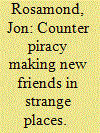

|
|
|
| 2 |
ID:
118079
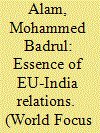

|
|
|
| 3 |
ID:
179963
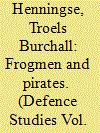

|
|
|
|
|
| Summary/Abstract |
What role can special operations forces (SOF) play against for-profit, illicit networks in operations with strict rules of engagement? How can small states utilize their SOF units to add value to a military strategy in cases where they take an active role in multinational operations? Based on in-depth interviews with members of maritime SOF units, commanding officers, and archival research, this article unearths the roles that Danish and Dutch maritime SOF units played against Somali piracy networks. Specifically, it analyses how SOF units were able to evolve their tactics, which allowed the international naval task forces to target the piracy networks’ increasingly sophisticated operations. Moreover, the article discusses other potential ways SOF units can influence for-profit, illicit networks. The case study sheds light on an aspect of the utility of SOF often overlooked in the literature, namely the ability to use discriminate and proportional violence in operations that straddle the categories of peace and war. This almost mundane use of SOF units is of special interest in relation to small states, who may take on leadership roles if they are willing to engage in the development of the operational concepts.
|
|
|
|
|
|
|
|
|
|
|
|
|
|
|
|
| 4 |
ID:
092097
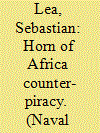

|
|
|
|
|
| Publication |
2009.
|
| Summary/Abstract |
On 23 January 2009, Portugal took over as lead nation of standing NATO Maritime Group One (SNMGI) under the command of RAdm jose Domingos Pereira da Cunha at an official handover ceremony from Spain in Ferrol.
|
|
|
|
|
|
|
|
|
|
|
|
|
|
|
|
| 5 |
ID:
106061
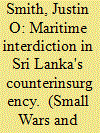

|
|
|
|
|
| Publication |
2011.
|
| Summary/Abstract |
A comprehensive maritime interdiction strategy to attack the insurgent's logistic system was a key element in the defeat of the Tamil Tigers. The campaign of maritime interdiction required the Sri Lankan Navy (SLN) to attack LTTE arms smuggling, sea piracy, and maritime terrorism. The SLN degraded the insurgency's robust maritime logistical network while also devising tactics to engage the maritime insurgents who reacted with swarm and suicide boat tactics. The efforts of the SLN forced the Tamil Tigers to confront the government's final land offensives with diminished resources, thus collapsing a three decades' old insurgency in a matter of months.
|
|
|
|
|
|
|
|
|
|
|
|
|
|
|
|
| 6 |
ID:
120227
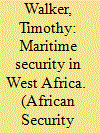

|
|
|
|
|
| Publication |
2013.
|
| Summary/Abstract |
This article will briefly examine the maritime security situation in 2013 in the Gulf of Guinea and the coast of West Africa, where a number of internationally integrative approaches for improving counter-piracy efforts are being developed. As the maritime domain is both vast and complex, the article focuses on two of the major problems causing the present situation of maritime insecurity - firstly, piracy and armed robbery at sea, and secondly, Illegal, Unreported and Unregulated (IUU) fishing. The progress in the provision of maritime security in regards to both problems is assessed. Finally, a number of concise recommendations for improving maritime security are highlighted.
|
|
|
|
|
|
|
|
|
|
|
|
|
|
|
|
| 7 |
ID:
093223
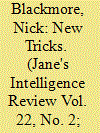

|
|
|
| 8 |
ID:
126285
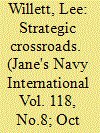

|
|
|
| 9 |
ID:
137642
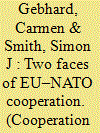

|
|
|
|
|
| Summary/Abstract |
Maritime engagement in the Gulf of Aden is a puzzling case for anyone interested in the political and institutional problems underlying European Union–North Atlantic Treaty Organization (EU– NATO) cooperation. Although the EU’s operation NAVFOR ‘Atalanta’ and NATO’s ‘Ocean Shield’ operate in the same theatre and with similar mandates, there is no formal link between them. No joint planning has been envisaged, and no official task-sharing takes place. As this article aims to show, cooperation and coordination between EU and NATO forces at the operational and tactical levels have nevertheless worked surprisingly well. Two faces of EU–NATO cooperation become apparent: the political level is dominated by a permanent deadlock, while on the ground and at sea staff have developed a modus operandi that allows them to deliver fairly successfully in complementing yet detached operations. Based on 60 interviews with EU and NATO officials (2010–2013), this article illustrates how the operational and tactical levels have developed ways of coordinating efforts informally despite the lack of a formal framework. It aims to show to what extent and how they succeed at bypassing organizational boundaries and at overcoming political limitations. Although these practices are becoming increasingly institutionalized, it remains to be seen whether this will translate into formal changes.
|
|
|
|
|
|
|
|
|
|
|
|
|
|
|
|